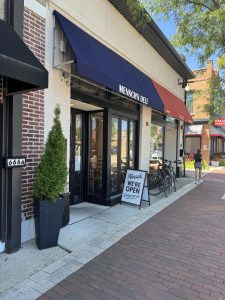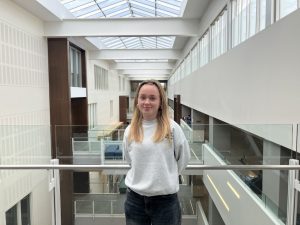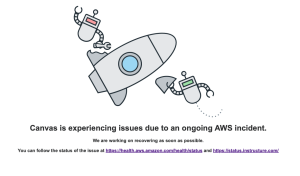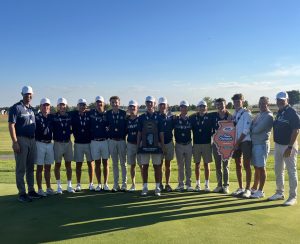Poetry Club lights the fuse at “Louder Than a Bomb”
Poetry club members participate in Chicago’s annual “Louder Than A Bomb” slam poetry competition
March 9, 2017
In a nondescript classroom on a regular Thursday, the few dozen members of Poetry Club can be found rhyming and rapping the afternoon away.
The club, led by senior co-heads Caroline Cobb and Jacqueline Steel, attended Louder Than A Bomb, a slam poetry competition sponsored by Young Chicago Authors.
The competition includes students from all over the Chicagoland area.
This included nearby high schools like Niles West, to urban magnet schools such as Gwendolyn Brooks College Preparatory Academy.
Sponsor and English teacher John O’Connor said the diversity of the students attending is, “the beauty of Louder Than A Bomb.”
Sophomore Lila Formicola, who joined the club last year said, “It was really exciting to be in an environment with people who shared a love for poetry and enjoyed talking about it.”
This year, New Trier poetry club entered four soloists and a group piece into the competition.
Although the club did not advance past the preliminary round, freshman Lydia Kaup said, “I was exposed to so many inspiring poems and poets. I left with many tips for my future work, and met a lot of role models.”
Formicola is equally as enchanted with the club and performance aspect as Kaup.
“It’s one of the most amazing things I’ve participated in,” Formicola said. “You’re surrounded by people of different backgrounds, all coming together for one sole purpose.”
The general vibe of the competition is that it is not a competition. It’s an appreciation of the art of poetry, she added.
While the club does experiment with other kinds of poetry, the spoken-word performance piece at the festival is the most anticipated event of the year.
However, there are also smaller performances and events they participate in, such as their upcoming reading at the Glencoe Public Library on March 12.
Poetry Club meetings typically begin with short introductions and an ice-breaker question created by the leaders.
Then, students have the opportunity to share any poems they are writing. Feedback and critique is generally appreciated.
Meetings conclude with the reading of poems by either famous authors or other group members, and if there is time, some writing.
With the emphasis on the group being student-led, sometimes creative disorder results.
O’Connor said of a typical meeting: “It’s a little bit chaotic.” However, this chaos manages to create a welcoming and unique environment, according to students.
O’Connor, who is in his twelfth year as sponsor of the club, and shares the job with photography teacher Tom Lau, said, “It’s a safe space in which people can experiment with language. It tends to be the one of the most eclectic, diverse, clubs in the school.”
This constrasts the many clubs that seem to cater to one specific group of people, added O’Connor.
The club has active members who range from freshman to seniors of all different genders and backgrounds, the only rule being to respect and support other people.
“There’s a great, friendly atmosphere that encourages all writers,” Kaup said.
This amiable environment extends all the way from the first club meetings to the final performance at Louder Than A Bomb.
Co-heads Cobb and Steel wrote the agenda for the club over the summer so as to increase productivity before the performance.
Many of the club members have been interested in poetry their whole lives.
Cobb said, “I remember being the only one excited for the poetry unit in any English class I was in.”
For students with a passion for writing, the club provides a creative and safe outlet.
The group also has conversations about big topics such as gender, race, sexual orientation, and politics.
While the main focus of the club is the final competition, the discussions and readings are emphasized as well, said O’Connor.
The creator of Louder Than A Bomb, Kevin Coval, had in mind these same goals.
According to the Young Chicago Authors website, the festival strives to create an environment in which creativity and expression is fostered and youth are engaging in conversations about important ideas.
A common saying at the festival is, “The point is not the point, it’s the poetry.”
Kaup experienced this at Louder Than A Bomb.
She said, “The points and competition aspect was not as important as sharing out and the satisfaction of being heard. I can’t wait to do it again next year.”












































